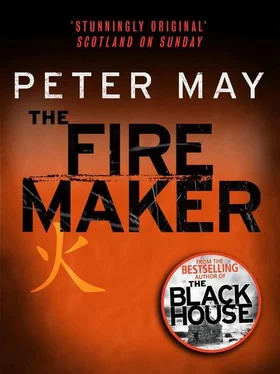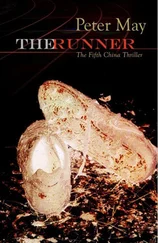By then it was time to pick up her hire bike and attempt the long and difficult journey to the University of Public Security. Whatever fears her observation of Beijing traffic the previous day had conjured up were as nothing compared to the reality. The roads were sheer and utter chaos. And if she had hoped an early start would avoid the worst of the traffic, then she was wrong again. The whole of Beijing, it seemed, was on the move. And no one, apparently, had priority — at junctions, at traffic lights, between lanes. It was survival of the boldest. Just go, and hope that the bus bearing down on you would give way rather than kill you. Strangely enough, it worked. And in the sticky hour it took Margaret to cycle to the university, she learned the golden rule of biking in Beijing — that there were no rules. Expect the unexpected and you would never be surprised. And for all the honking of horns (she soon realised their purpose was to alert you to a vehicle’s presence, or its impending manoeuvre), and the cutting between lanes, everyone on the road seemed remarkably even-tempered. Road rage had not reached China. It occurred to Margaret that all these drivers were so recently cyclists themselves, used to jockeying patiently for position in overcrowded cycle lanes, they did not automatically assume that they had priority simply because they were behind the wheel of a car, or bus, or lorry. These were Chinese exercising that most enduring of Chinese qualities — patience.
When finally she reached the university at around 7 a.m., there had been loud martial music blaring from speakers all around campus. Bob had found her in her office, window closed, elbows on the desk, fingers pressed to her temples.
‘Got a bit of a hangover?’ he asked. His tone made her glance up at him sharply, but there was no hint in his expression of the sarcasm she had detected in his voice.
‘What is that goddamned music?’
‘I wouldn’t go around calling it “that goddamned music” if I were you,’ he said. ‘It’s the Chinese national anthem. They play it every morning.’
‘Then thank God I didn’t take an apartment here,’ she said.
‘Tried Advil?’ he asked.
She glared at him. ‘I just bought shares in the company.’ She leaned over to lift her rucksack on to the desk. ‘Listen, you said yesterday that after two years you still hadn’t managed to photocopy your lecture notes. I take it that was a joke?’
He shrugged. ‘Well… sort of. It was a kind of metaphor to illustrate that things here don’t always work like you would want them to. I did actually get my notes photocopied. Eventually.’
‘Good.’ She lifted a book out of her rucksack. ‘I want to photocopy a description of an autopsy.’ She dropped the book on her desk. Bob turned it round to face him. EVIDENCE DISMISSED. The Inside Story of the Police Investigation of O. J. Simpson . ‘I take it they’ve heard of O. J. Simpson in China?’ she said.
‘Oh, yes,’ Bob said. ‘They’ve made quite a study of the case here. They use it to demonstrate the failings of the American justice system.’ She flicked him another glance to see if he was being facetious. ‘They may just have a point,’ he added.
She railed protectively, ‘It wasn’t the system that failed. It was sloppy police work and incompetent prosecution. Theirs was the burden of proof. Theirs was the failure. Better that ten guilty men go free than that one innocent man is wrongly convicted. The presumption of innocence is still paramount.’
‘Yeah, well, the Chinese have only just introduced that concept into their legal system. I don’t think they’ve quite got used to the idea yet.’
‘What?’ Margaret looked horrified.
‘What you’ve still not grasped, Margaret’ — Bob had become smug again — ‘is that culturally, historically, American and Chinese societies are a million miles apart. You can’t just come here and expect to apply American values to Chinese society. Or vice versa. The Chinese have always, since the days of Confucius, emphasised the need for the individual to suppress personal ambition in favour of social harmony. The rights of society are given greater emphasis than the rights of the individual. “The nail that sticks up gets hammered down.” And that idea, and the practice of it, was around three thousand years before the communists ever came on the scene.’
‘So what about the rights of the individual in law?’
‘The accused, in the Chinese constitution, has plenty of rights. The trouble is that in China individual rights go hand in hand with a responsibility to society. There is no right without duty. So there’s built-in conflict.’
In spite of her increasing antipathy towards Bob, Margaret found her interest being engaged. ‘Like what? I mean, give me an example.’
‘Okay.’ Bob waved a hand vaguely towards the ceiling. ‘According to Chinese law a defendant has the right to defend himself. But he also has a duty to co-operate with the police and the court in uncovering the truth about his case. You might think that right to defend himself would lead automatically to a right to silence under interrogation, to protect himself, like Americans take the Fifth. Only he also has a duty — to the state, to society — to answer all questions faithfully and truthfully, even if that incriminates him.’
‘Well, that’s crazy!’
‘Is it?’ Bob sat on the edge of her desk. ‘I mean, in America we’re so obsessed with protecting the rights of the individual, we sometimes forget about the rights of society. At least the Chinese are trying to accommodate both.’ He sighed and shook his head. ‘The real problem with China is that while the defendant’s rights are pretty well protected in the constitution, they’re often neglected, or even abused, in practice. But there’s a lot of bright people in this country working hard to change that. And not without success. Things are improving.’
After her lecture from Bob had come her meeting with Mr Cao. He had been very polite and smiled a lot, and told her that while they usually had access to a 35mm slide projector it was not currently available. In that case, she had told him, smiling fixedly in return, the substance of her lectures would be necessarily limited, since they were all based around the visual presentation of real-life material. Perhaps he would like to see if they could borrow a slide projector. He doubted if that would be possible, but said he would see what he could do. And yes, he agreed, it would be an excellent idea if it could be arranged for her students to witness an actual autopsy. Unfortunately, he thought, this might be a little difficult to arrange. He told her he had timetabled three lectures a week, and she had shaken her head sadly and told him that, unfortunately, she had only brought material for twelve lectures. However, if he could arrange access to an autopsy, then she was sure she could fill in the other six hours without any difficulty. There was a further exchange of frozen smiles. He said he would see what he could do.
There had followed a brief period of relative calm before the nightmare resumed with the arrival of Lily Ping. She presented her unsmiling face at the door of Margaret’s office shortly after 9 a.m. ‘You got everything you need?’ she had made the mistake of asking.
‘Well, no, actually,’ Margaret said. ‘I don’t have a slide projector, so most of my lecture material is redundant. I can’t find the photocopier anywhere…’
‘You want something photocopy?’ She held out her hand. ‘I arrange for you.’
‘Oh.’ Margaret was taken aback. This was new. Co-operation. ‘Sure.’ She picked up the O. J. book. ‘I need about twenty copies.’ Lily snatched the book from her and was halfway out of the door before Margaret could call after her, ‘Pages 108 to 111.’ She crossed the office hurriedly and called down the corridor, ‘Before ten. I’ve got a class at ten.’
Читать дальше












